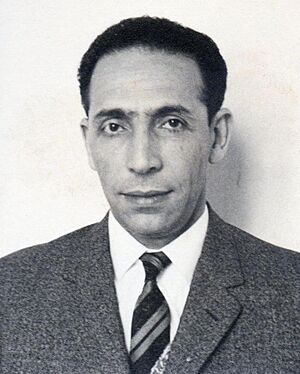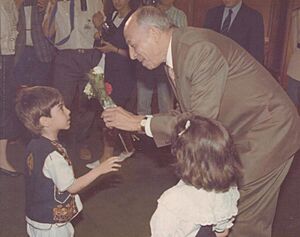Mohamed Boudiaf facts for kids
Quick facts for kids
Mohamed Boudiaf
|
|
|---|---|
| محمد بوضياف | |
 |
|
| Chairman of the High Council of State | |
| In office 16 January 1992 – 29 June 1992 |
|
| Prime Minister | Sid Ahmed Ghozali |
| Preceded by | Abdelmalek Benhabyles (Acting) |
| Succeeded by | Ali Kafi |
| Personal details | |
| Born | June 23, 1919 Ouled Madhi, M'Sila Province, French Algeria |
| Died | June 29, 1992 (aged 73) |
| Cause of death | Assassination |
| Political party | FLN (1954–1962) PRS (1962–1979) |
| Spouse | Fatiha Boudiaf |
Mohamed Boudiaf (born June 23, 1919 – died June 29, 1992) was an important Algerian political leader. He was one of the people who helped start the National Liberation Front (FLN). This group led the fight for Algeria's independence from France. This fight was called the Algerian War of Independence (1954–1962). After Algeria became independent, Boudiaf was sent away from the country. He did not return for 27 years. In 1992, he came back to become the Chairman of the High Council of State. Sadly, he was killed just four months later.
Contents
Early Life and Nationalist Movement
Mohamed Boudiaf was born in Ouled Madhi, in what was then French Algeria. His family had once been important, but they lost their power during the time France ruled Algeria. He had to stop school early because he was not well. He also became very active in the movement that wanted Algeria to be free.
He joined a group called the Parti du Peuple Algérien (PPA). Later, he joined another group called the MTLD. This group had a secret military part called the Organisation Spéciale (OS). Boudiaf helped organize the OS in the Sétif area. He stored weapons, collected money, and prepared fighters for a guerrilla war. The French government sentenced him to 10 years in prison, but he was not caught.
Later, Boudiaf and other leaders formed a new group called the CRUA. They wanted to prepare for a revolution. Boudiaf disagreed with some of the older leaders. In July 1954, someone tried to kill Boudiaf in Algiers, but he survived.
Algeria's Fight for Freedom
The CRUA group later became the Front de Libération Nationale (FLN). On November 1, 1954, the FLN started an armed uprising against France. This began the Algerian War of Independence. Boudiaf was a key leader of this movement. He worked from places like Cairo and countries next to Algeria.
In 1956, French forces captured Boudiaf and other FLN leaders. They were taken from an airplane and put in prison in France. Even while he was in prison, he was chosen as a minister in the FLN's government-in-exile. This government was called the GPRA. He was also named one of the Vice Presidents. He was set free just before Algeria became independent in 1962. The war had been very difficult and many lives were lost.
After Independence: Opposition and Exile
After Algeria became independent, there were many disagreements within the FLN. Different groups fought for power. A military leader named Houari Boumédiène and Ahmed Ben Bella formed an alliance. They took control and set up a one-party government with Ben Bella as president.
Boudiaf did not agree with these changes. He started a secret opposition party called the PRS. This group briefly rebelled against the government. Because of this, Boudiaf was forced to leave Algeria. He went to live in Morocco. He continued to oppose the government even after new leaders took over. However, he was no longer a major political force in Algeria during his exile.
Return as Head of State
In February 1992, after 27 years away, the military invited Boudiaf to return to Algeria. They asked him to become the chairman of the High Council of State (HCE). This happened after the results of an election were cancelled. He quickly accepted the job.
People saw him as a leader who had been away for so long that he wasn't involved in the problems of Algerian politics. However, many Algerians didn't know him well. He called for big changes and for the military to stop controlling politics. This gave people hope, and he became somewhat popular. But he still depended on the military that brought him to power.
The country was also moving towards a civil war. Violence from Islamist groups was increasing. The military's harsh actions made the situation worse. The economy was struggling, and Boudiaf found it hard to make the changes he had promised.
Assassination and Legacy
On June 29, 1992, Boudiaf was killed. He was giving a speech on TV at a cultural center in Annaba. This was his first visit outside Algiers as head of state. A bodyguard shot him. His murder shocked Algeria and is a very important moment in the country's history.
After his death, Boudiaf became even more respected. Many people now call him a martyr for Algeria. They believe he could have saved the country. The person who killed him, Lieutenant Lambarek Boumaarafi, was said to have acted alone. He was sentenced to death in 1995, but the sentence was not carried out.
Many people have different ideas about who was really behind the murder. Some believe that the military, who put him in power, was responsible. These ideas often focus on the fact that Boudiaf had started to fight against corruption. He had also removed some important military officials from their jobs.
Boudiaf's wife, Fatiha, is still alive. She believes that his death has not been properly investigated.
Honours
National honour
See also
 In Spanish: Mohammed Boudiaf para niños
In Spanish: Mohammed Boudiaf para niños
- Declaration of 1 November 1954
Literature
- Achour Cheurfi, La classe politique algérienne, de 1900 à nos jours. Dictionnaire biographique (Casbah Editions, 2nd edition, Algiers 2006)
| Political offices | ||
|---|---|---|
| Preceded by Abdelmalek Benhabyles Acting as President of the Republic |
Chairman of the High Council of State 1992 |
Succeeded by Ali Kafi |


